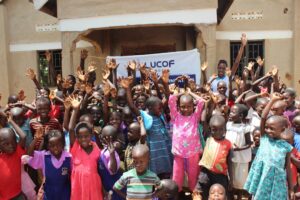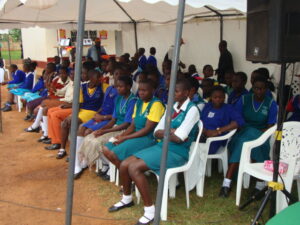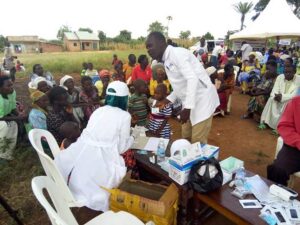LUCOF UGANDA has its genesis in the desire of one man, the late LUBEGA COSMAS, to move out and share to the community in a remarkably practical way. His desire to serve among the unprivileged communities, women and children started back as early as 1980s in the communities of Luweero, Masaka and Wakiso districts.
As a humble man of substance, he used the little resources he had, and always shared it with the unprivileged people in the communities, right from the time he was a youth. Having grown up with a religious background and having been inspired by the fundamental impact that comes along with charity, Lubega Cosmas tirelessly assisted the suffering people in the 1980-86 war in the Luweero triangle.
Since that time, he never turned back in executing positively enormous, substantial and remarkable community development initiatives. He used local resources like community services, local organisations, informal and formal education approaches, cheap local health approaches, partnerships, research and advocacy.
Increasing incomes and alleviating poverty
From 1995-98, he educated local community groups in programmes through MAFADEP and PAP in poverty alleviation. He introduced VEDCO in 1997 from Luweero to Nangabo, thus educating hundreds of farmers, entrepreneurs, women, the youth; and in 1998, he introduced UMU (Uganda Micro-finance) from Busiika to Nangabo-Kasangati, thus benefiting and impacting thousands of people.
In his wholistic approaches and being all-inclusive in nature, in 1998, he mobilized 270 farmers to Namulonge agriculture research centre in NARO and were trained in modern agriculture practices. He worked with Makerere University department of extension staff and students to train farmers in Katadde, Masooli, Bulamu, Wampeewo, Wattuba, Kitegomba, among other areas. He assisted more than 78 farmers in the St. Jude Busesa farming project in Busesa Masaka. In 1999-2000, he introduced the vice-presidential coronal coffee projects, beans, maize, fertilizers in 49 zones of Nangabo and Luweero.
In collaboration with UCDA and Namulonge Research centre, he sensitized farmers in coffee, potatoes, cassava and yams. He created more than 37 farmer and entrepreneurial groups; 6 in Masooli, 5 in Kiteezi, 5 in Nangabo and Kitegomba, 6 in Gayaza, 2 in Bulamu, 8 in Wampeewo. He partnered with UWESO in education and health. He Introduced Heifer Project International to Nangabo subcounty, where 7 cows where supplied in Masooli parish, 12 in Wampeewo, 11 in Gayaza, 19 in Kabubbu, 6 in Nangabo-Kitegomba, 4 Kiteezi among other areas.


He helped in the establishment of many local community schools in Nangabo subcounty parishes, and local community vocational schools like Network for African youth. He secured land for the REDCROSS in Kasangati to establish schools. He partnered in the rehabilitation of local schools such as Masooli P/S, Katadde P/S, Katta P/S. Training of the teaching staff, with train the trainer courses, practitioner learner ships, and communication in primary school children.
He provided logistics to schools, such as chalk, library books, latrines, water tanks, laboratory equipment, and vocational material, on top of charity outreaches to poor school-going students in providing shoes, books, and pens.
He promoted girl-child education by using the little he had in paying fees to poor school going girls in Namalere and other parts of wakiso, as well as securing bursaries for them.
While working for Buganda kingdom between 2002-2009, he he secured bursaries to thousands of unprivileged students and helped them have a decent education. He advocated and practically executed adult literacy programmes, with adult basic education and training, community capacity building, large scale project management, run home to read projects, farmer and business sensitisations, plus bridging training programmes for youth and adults.
He coordinated with UNICEF in 2000 and made pit latrines in Wattuba Primary school, Katta COU Primay school, Katadde schools, Kitagobwa, Zirobwe, Kazinga, Kasangati moslem primary school, Wampeewo primary school among others. Helped communities in Wakiso and Luwero in fighting malaria through sensitization, and partnerships with health centres such as Kasangati health centre, Zirobwe health centre, Komamboga health centre. He opened a war against HIV/AIDS by considering the fact that HIV/AIDS doesnot occur in a vacuum, and he focused on broader health systems strengthening, and quality health care for everyone. He executed non-profit sensitization, medical research, and capacity building.

He helped in building Wattuba health centre in coordination with Nangabo subcouty, worked with UWESO in promoting health in communities. He worked with Mpigi district in constructing hundreds of pit latrines in communities and schools. Immunization programmes where a priority in his projects, with tireless sensitization of mothers in communities, and participatory partnerships. Hygiene in homes, with the erecting of utensil drying racks and gabbage pits where of paramount importance in his household outreach projects.
He contacted and worked with European Development Fund (EDF) and JICA in setting up boreholes in Wampeewo, Masooli, Kabubbu, plus shallow wells in Magere, Seeta and Luteete. He also coordinated with the Mpigi district local council board in putting up shallow wells in Solobera, Soweto and a bore hole in Lugonja road. He worked hard in ensuring that schools like Katadde primary school, Kitegomba primary school and Kasangati moslem community schools get 10,000-liter water tanks.
He, with high-class commitment, helped to introduce piped water in Nangabo subcounty and other parts of Wakiso district. He mobilized communities in Wakiso and Luwero district in reclaiming and clearing wetland land water sources and wells to provide clean and hygienic water to the communities.
Having noted that climate patterns shape the natural ecosystems on which the world depends and having realized that there cannot be sustainable development without environmental protection, Lubega Cosmas prioritized sustainable environmental management in his life work.
Right from his youthful life in the 1970s up to his death time in 2009, he involved the communities in areas of Masaka, Wakiso and Luwero in environmental protection, as an integral part of development.

He sensitized the populace about environmentally friendly agricultural practices, introduced them to bio-gas energy, wetland protection, proper waste management, constructed hundreds of firewood saving rocket stoves in poor households. Between 1990-2009, he engineered the planting of hundreds of thousands of trees in de-vegetated areas, as well as fruit trees in community households.
His efforts as a community leader in the local government, as well as in the Buganda Kingdom helped create a degree of sustainable community development. His mobilization of the communities in maintaining and rehabilitating of roads proved fruitful, for example Ssemakula road, Kyambogo, Lugonja, Lubega Cosmas road, Soweto-Kasangati road, Wattuba-Kabunza road, Nalusugga, Mayiriiti, Kitegonba, Mawule among others. His works to build the Nangabo subcounty local council building, Kasangati community centre and the court building in Kasangati have all proved productive.
Lubega Cosmas was a unique and outstanding community leader. He was a leader in the church, in the community as a councilor of Masooli parish, and as the chief of the Kabaka (King of Buganda kingdom) in Nangabo subcounty. While meeting the youth in Katadde parish in 2005, Lubega Cosmas said;
Under your shoulders. Dear young people of this parish, weigh the responsibility to transform tomorrow's world into a society where peace, harmony and fraternity reign.
He executed different youth campaigns and meetings with the main goal of promoting excellence in leadership and unveiling the entrepreneurship potential empowering individuals to take charge of their own destiny and excel in today’s modern world regardless of educational background. We aim to raise awareness of the Uganda youth on their personal and professional capabilities and potentials.
We aim to enhance the capacities and competitive advantage of rural youth to enable them to enter the job market as qualified employees and business owners. Lubega Cosmas had a belief that a strong leadership and entrepreneurial approach practically implemented at the grass roots gives an effective path to creation of sustainable development opportunities in effort to meet the essential human needs.
It’s from the above efforts of the late LUBEGA COSMAS, and much more, that the LUCOF UGANDA Board and staff plus partners are working tirelessly to continue with this great work. Through our departments of CHILDNET UGANDA, YOUTHNET UGANDA, HOPE FOR THE AGED UGANDA, BETTY LUBEGA NAJJUMA (BELUNA) WOMEN INTIATIVE and HANDS FOR EARTH SUPPORT SERVICE ORGANISATION, LUCOF UGANDA pledges to continue being committed to improving the livelihoods of poor children, women, youth, the aged, disabled, environmental protection; fighting HIV/AIDs, Malaria, improving hygiene and nutrition, agricultural development, water and sanitation, education, research, advocacy, and partnerships in a wholistic approach.
Uganda Registration: S.5914/11502
Nederland Registratie: Kvk-nummer 83487166
BTW-Identificatienummer: NL862892983BO1